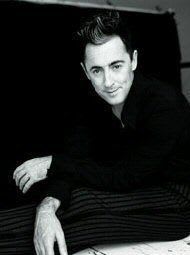In reviving this classic gay play, Daniel Kramer was always going to have to put up with comparisons with the original, which starred Sir Ian McKellen at the Royal Court in 1979.
The play was also filmed almost twenty years later, with a cast that included not only Clive Owen but Sir Mick Jagger as transvestite singer Greta, and, in minor roles, Jude Law, Sadie Frost and Rachel Weisz.
Kramer is a pretty confident man, at the moment riding high after a series of successes and about to open the Broadway transfer of Woyzeck, which was such a success at the Gate a couple of years ago.
The big draw card is the New York-based, gay Scottish actor, Alan Cumming, nowadays perhaps best known for his performances on film in X2 - X-Men United opposite Sir Ian but also garlanded for stage work on both sides of the Atlantic.
He plays Max, who even by decadent Berlin standards in the mid-1930s is a hedonist par excellence. His partner in crime is a dancer, Rudy, played with charming wit by Kevin Trainor. He has a lot to put up with, even before the drunken Max seduces a prototypically Aryan officer with disastrous consequences.
One of Daniel Kramer's skills, aided on this occasion by designer Robin Don, is a tremendous vision, which means that each set before the interval is both appropriate and colourful, as well as fitting into the sprung square, rather like a boxing ring. Not only does it look good, but the scene changes, which could easily have slowed down the action, are almost instantaneous.
Wolf, the hunky SA officer could nowadays almost be regarded as a metaphor for Aids. The problem that he spreads stretches right across Berlin, as the SS wage an internal war on their erstwhile colleagues, which means that Max and Rudy are no longer safe in their home city.
After brief meetings with transvestite nightclub chanteuse, Greta (Richard Bremmer) and Max's more diplomatic but equally gay Uncle (Hugh Ross), the pair flee and are forced to live in a forest for two years before finally being taken to Dachau.
In fact, despite Max's loyalty to his friend earlier in the play, when the chips are down he effectively clambers off the train and into the concentration camp over Rudy's dead body.
Once in the camp, the anti-hero's skill as a wheeler-dealer comes to the fore and remarkably, he gets himself the yellow star of a Jewish inmate rather than the pink triangle that his homosexuality requires.
The Jews may have suffered horribly during the Holocaust but apparently, even they were one rung above men who were then known as "queers".
Once in the camp, Max replaces the mutually dependent relationship that he had with Rudy, with something similar with Horst, played with great sensitivity by Chris New.
After the interval, we enter lives that consist of eating watery soup, sleeping and carrying rocks backwards and forwards as a means of not very subtle torture.
In this context, Max and Horst begin to build a loving relationship even though they are not allowed to talk to each other. While this is moving, the pace begins to slip for a period but picks up towards the final scenes which must inevitably be devastatingly sad.
Daniel Kramer has provided a worthwhile revival of an important drama and is well supported by Alan Cumming who clearly gives his all, both when Max is partying and slaving.
This is a very strong and touching production and Bent will undoubtedly prove popular with a community that is still not as well served as it should be by mainstream theatre. Whether those who remember Sir Ian McKellen will regard this as a pleasant aide memoire or a slightly disappointing attempt to recreate an unforgettable hit remains to be seen.
